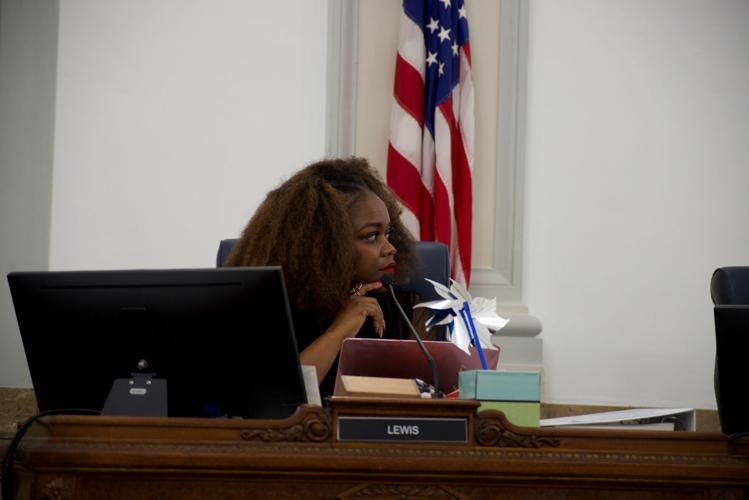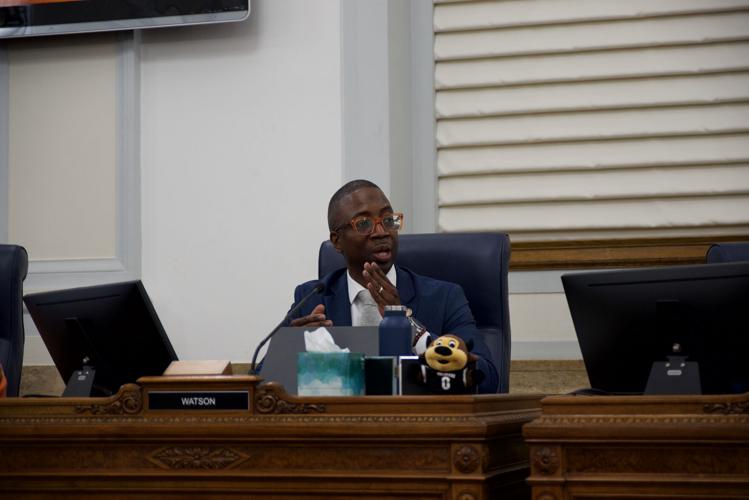Denver’s councilmembers clash over Mayor Mike Johnston’s sales tax hike proposal
Denver’s councilmembers on Monday clashed over a proposal that, if approved, would catapult Denver as among the local governments with the highest sales tax rate along the Front Range.
Some want to limit the spending to benefit residents under a certain income bracket. Others balked at the idea.
One said the money’s distribution should be split among the income brackets.
All told, the councilmembers prepared more than 10 amendments to the measure that seeks to hike the sales tax by 0.5 points in order to generate $100 million in revenue. Mayor Mike Johnston, who is pushing for the tax increase, wants to allocate the money for affordable housing.
Roughly half of the amendments had progressed by 9:30 p.m., and much of the discussion centered on who, exactly, the sales tax hike should help.
Councilmember Shontel Lewis, who sponsored the sales tax hike, introduced four amendments. One sought to prohibit spending from the new revenue to projects for households who earn 80% to 120% of the area median income (AMI) — barring a “demonstrated community housing need.”
Instead, Lewis wants the money to flow to projects benefitting residents at the 80% or lower mark.
“The purpose of this amendment is to avoid use of public money to subsidize building of rental housing that is currently market rate by lowering the AMI threshold but allowing it to ‘float’ up to 100% of AMI depending on market conditions,” she said.
The amendment drew support from Councilmember Serena Gonzales-Gutierrez.
But Councilmember Flor Alvidrez wasn’t sold on the idea.
Alvidrez said there appears to be something of a “disconnect” between market rate units and 100% area median income.
A “market rate unit” doesn’t always translate to 100% AMI, she said.
Joining Alvidrez, Councilmember Amanda Sawyer said the bill, as written, actually supports the “missing middle” segment of housing — meaning housing for those in an 80% to 120% AMI bracket.
“The affordable Denver initiative is meant to address that demonstrated need, which is higher than 80% AMI,” Sawyer said. “And so if it’s not going to address that, it’s not going to do what we have been telling people it’s going to do, and I can’t support that.”
Councilmember Darrell Watson, who is one of the bill’s sponsors, criticized the amendment, as well, saying many in his district fall through the cracks of existing housing affordability measures, which are targeted at those making 80% AMI or lower and not those struggling in the “missing middle.”
As written, Watson and Councilmember Amanda Sandoval agreed the bill gives the city the “flexibility” to catch people it is struggling to help.
Councilmember Chris Hinds, who balked at Lewis’s amendment, said he wants to see the money from the sales tax be tied to areas of need as identified by a Department of Housing Stability chart in a committee meeting.
Broadly speaking, the chart demonstrated roughly half of the city’s needed affordable units fell into the 0-30% AMI bracket, while only 16% fell into the 80-100% bracket. Given the tax hike is estimated to generate $100 million budget, Hinds said the city should allocate $16 million to housing in the 80-100% bracket and $47 million to the 0-30% AMI bracket.
Ultimately, the council voted Lewis’ amendment down — with Sandoval, Hinds, Alvidrez, Sawyer and Watson, along with Councilmembers Kevin Flynn, Stacie Gilmore and Diana Romero Campbell, rejecting it.
Assuming it could get through the amendments, the council was supposed to hold a 30-minute “courtesy” public hearing on the sales tax hike.
Here’s what the rest of the councilmembers are pushing for.
Alvidrez wanted to add a 10-year sunset provision, include a “sustainability” statement in the intent section, adjust the date for the completion of the needs assessment study, and add a provision to assist homeowners and renters affected by factors outside of their control.
Gilmore is pushing to to make it clear to voters that preservation of housing is an equal priority of this measure.
Gonzales-Gutierrez wants to strike the 30-day language that is tied to Council approval of the plan and gives the council an affirmative duty to pass it within 60 days of its receipt.
Hinds said wants to replace broader language with more specific, accessibility-focused provisions and require applications to supersede state and federal minimums.
The mayor’s sales tax hike must appear before the council twice before it can be sent to the voters for approval.
Ultimately, Denver voters will decide the fate of the mayor’s tax hike proposal, as well as another sales tax increase that the City Council already sent to the ballot. Combined, the two proposals would generate close to $200 million annually and make Denver the city with the highest sales tax in the metropolis and Northern Colorado, rivaling only Colorado’s resort and mountain towns.
The other proposal, which would raise sales taxes by 0.34 points and is meant to fund Denver Health, is already headed for the ballot box.
The Metro Denver Chamber of Commerce came out in support of the tax hike to fund Denver Health, but the proposal to increase Denver taxes by 0.5% divided its board, according to a spokesperson with the chamber.
Here's how the sales tax in Denver works
The Downtown Denver Partnership, meanwhile, decided to throw its support behind both measures, with spokesperson Britt Diehl citing the “critical services” that Denver Health provides to the city. Diehl said the partnership sees both measures as an important way to support Denver, where “all can grow and thrive.”
“Housing affordability continues to be one of our city and state’s most pressing issues, impacting quality of life and competitiveness alike,” She told The Denver Gazette on Monday. “Public health and housing represent two of our policy priorities.”
Thinking of living in Denver? Here's how much taxes you'll likely pay — and where it goes
The local think tank Colorado Fiscal Institute, which broadly sees sales taxes as a “regressive” form of finding revenue, said it offers an advantage by capturing money from tourism.
“We normally aren’t a fan of sales tax since they are very regressive,” said senior economist Chris Stiffler, noting the familiar argument that a sales tax hike places a disproportionate burden on lower-income residents.
“Normally, we’d say pair a modest sales tax increase with some type of offset like a targeted income tax credit to those low-income households,” he said. “That’s doable at the state level, maybe a little harder at the Denver level since Denver doesn’t collect income taxes.”
While not a fan of a sales tax increase, Stiffler said it does have a benefit that an income tax or tax credit wouldn’t capture — tourism.
Tourists in Denver account for about a fifth of sales taxes paid, according to modeling from the Colorado Fiscal Institute.
And prices for businesses will likely not see much of an impact, Stiffler said, since a sales tax increase will raise the total paid by the consumer, rather than the sticker price.
As for inflation, which has been a worry for many consumers lately even as it appears to be cooling, Stiffler said it is difficult to predict the revenue impact to the city.
Much depends on consumer spending, he said, which the institute typically likes to see growing at around 3% to 4% year over year. It currently sits at 2.4%.
If approved, these two sales tax rate increases will be the seventh and eighth such increases Denver voters have adopted in six years, and the eighth and ninth since 2006. The first sales tax hike from 2006 increased the rate by 0.15 points, and the money was earmarked for the Denver Preschool Program.
With sales taxes possibly going up, when can Denverites expect them to come down?
“I wouldn’t speculate on that,” Stiffler said. “I will add that consumers continue to shift their purchases toward services instead of tangible goods.”
He added: “Since many services aren’t subject to sales tax, this overall reduces the sales tax base requiring higher rates to generate the same amount of revenue.”







